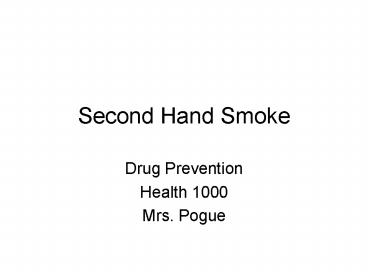Second Hand Smoke - PowerPoint PPT Presentation
1 / 21
Title:
Second Hand Smoke
Description:
Nonsmokers who breathe air containing tobacco smoke are also at risk for health problems. ... When visiting a home in which someone smokes: ... – PowerPoint PPT presentation
Number of Views:385
Avg rating:3.0/5.0
Title: Second Hand Smoke
1
Second Hand Smoke
- Drug Prevention
- Health 1000
- Mrs. Pogue
2
Secondhand smoke is harmful, but there are ways
to reduce exposure.
3
Health Risks of Tobacco Smoke
- Tobacco smoke can harm nonsmokers.
- Nonsmokers who breathe air containing tobacco
smoke are also at risk for health problems.
4
Health Risks of Tobacco Smoke
- Environmental tobacco smoke (ETS) is also called
secondhand smoke.
Environmental tobacco smoke (ETS)
Air that has been contaminated by tobacco smoke
5
Health Risks of Tobacco Smoke
- Environmental tobacco smoke is composed of
- mainstream smoke and
- sidestream smoke.
6
Health Risks of Tobacco Smoke
- Because mainstream smoke has been exhaled by a
smoker, it contains lower concentrations of
carcinogens, nicotine, and tar.
Mainstream smoke
The smoke exhaled from the lungs of a smoker
7
Health Risks of Tobacco Smoke
- Sidestream smoke is more dangerous than
mainstream smoke.
Sidestream smoke
The smoke from the burning end of a cigarette,
pipe, or cigar
8
Health Risks of Tobacco Smoke
- ETS from cigarettes, cigars, and pipes contains
more than 4,000 chemical compounds. - More than 50 of those chemicals are
cancer-causing carcinogens.
9
Health Risks to Nonsmokers
- ETS causes eye irritation, headaches, ear
infections, and coughing. - It worsens asthma and other respiratory problems,
and it increases the risk of lung cancer and
coronary heart disease.
10
Health Risks to Unborn Children and Infants
impaired fetal growth
spontaneous miscarriage and prenatal death
Smoking during pregnancy reduces blood oxygen
levels, increasing the risk of
premature delivery
low birth weight
deformities
stillbirths
11
Health Risks to Unborn Children and Infants
- Infants exposed to ETS after birth are twice as
likely to die of SIDS. - They may have severe asthma attacks, ear
infections, or respiratory tract infections.
12
Health Risks to Young Children
- The children of smokers are more than twice as
likely to smoke themselves. - They also have a higher incidence of
- sore throats
- ear infections
- upper respiratory problems
13
Health Risks to Young Children
- Parents protect the health and development of
their children by staying tobacco-free.
14
Reducing Your Risks
- You can take action to reduce the effects of ETS.
- Express your preference wherever you can for a
smoke-free environment.
15
Reducing Your Risks
?
Encourage smokers to quit.
16
Reducing Your Risks
stay outside or in a different room as much as
possible.
When visiting a home in which someone smokes
ask to open the windows to provide fresh air.
suggest meeting elsewhere, such as in your home
or at a library.
17
Creating a Smoke-Free Society
- In most states, it is illegal to sell tobacco to
teens under the age of 18, and it is illegal to
smoke in public places.
- In the United States, efforts to create a
smoke-free society continue to grow.
18
Creating a Smoke-Free Society
- Smoking is prohibited in many restaurants, and
some restaurants are required to have a
nonsmoking section.
19
Supporting National Health Goals
- One of the goals of Healthy People 2010 is to
reduce tobacco use and the number of
tobacco-related deaths. - States and local communities are also supporting
the efforts to create a smoke-free society.
20
Supporting National Health Goals
- Laws restrict where people may smoke, as well as
who can buy tobacco products.
21
Supporting National Health Goal
Laws prohibiting the sale of tobacco to minors
have been enacted.
Some states have successfully sued tobacco
companies to recover the costs of treating
tobacco-related illnesses.
Community activities that promote a healthy
lifestyle provide everyone with the opportunity
to practice healthful behaviors.































